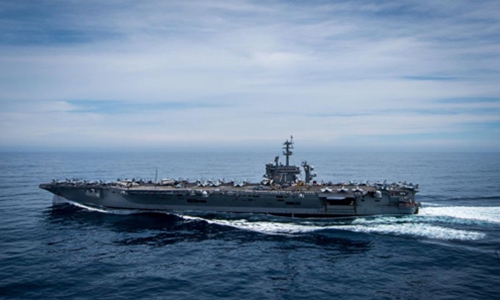US sailor’s death a needless tragedy in a faulty strategy
Source:Global Times Published: 2020/4/14 19:03:40

USS Theodore Roosevelt transits the Pacific Ocean on April 7, 2017. Photo: US Navy
A sailor on board the USS Theodore Roosevelt has reportedly died from COVID-19, the first virus-related death among the aircraft carrier's 600 active-duty crew members who have tested positive for the coronavirus.This is a pure tragedy. The global pandemic has brought the world to a critical time when all countries must work together to defeat the deadly virus. The tragedy on this US aircraft carrier shows that Washington continues to focus on geopolitical competition rather than coping with the invisible threat to humanity.
The US administration is partially to blame for the tragedy. The US government has shown it was more concerned with pestering its so-called "competitors" than dealing with the early stages of the virus outbreak. Washington insisted on ordering the carrier to carry out useless surveillance missions and then attempted to conceal the fact that some crew members had contracted the coronavirus. It even fired the ship's captain after his pleas for help became public. The farce continued days later when the acting Navy Secretary was ousted for his mishandling of the mess on board the warship.
Washington might think it can frighten its "competitors," but this remains only wishful thinking. Now, the death of the sailor might have an impact on the country's politics and military.
During the looming presidential election the incident is a manifestation of the incompetence of President Donald Trump's administration, and might impact his reelection. His administration's anti-pandemic efforts will undoubtedly be an issue for his campaign.
The Trump administration's disregard for soldiers' lives and the virus outbreak on board the ship will definitely serve as powerful evidence of an improper response to the pandemic. The Democrats will no doubt use this to attack the Trump administration.
Meanwhile, the epidemic on board the ship is likely to affect the deployment of the US military.
US soldiers may also suffer from low morale as they surely consider epidemic prevention more important and urgent than their operational missions.
The Trump administration has been vigorously advocating its Indo-Pacific Strategy, which is solely aimed at containing China. But the coronavirus outbreaks on the USS Theodore Roosevelt, which is currently docked in Guam due to the infection, and on other US aircraft carriers, such as the USS Nimitz that is to be deployed to the Pacific, will limit the US military's operational and deployment capabilities in the region.
The crews of the US Navy's nuclear-powered aircraft carriers and submarines are at high risk of contracting the coronavirus and the US military will surely have to be more cautious and reduce their missions. Meanwhile, US allies might also reduce their presence in the Indo-Pacific region if they don't have backup from the US.
The US Navy's provocative missions in China's territorial waters, including in the South China Sea and the Taiwan Straits, are likely to be stepped down as the navy deals with containing the coronavirus on board its ships. However, the US military will likely continue it aerial reconnaissance of China's territorial waters.
The long-term strategic deployment of US force, however, is not likely to change.
The article was compiled by Global Times reporter Yan Yunming based on an interview with Ni Feng, deputy director of the Institute of American Studies of the Chinese Academy of Social Sciences. opinion@globaltimes.com.cn
Posted in: VIEWPOINT